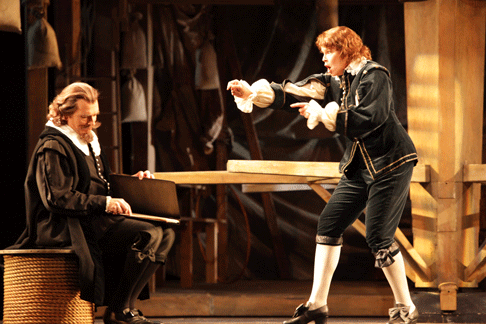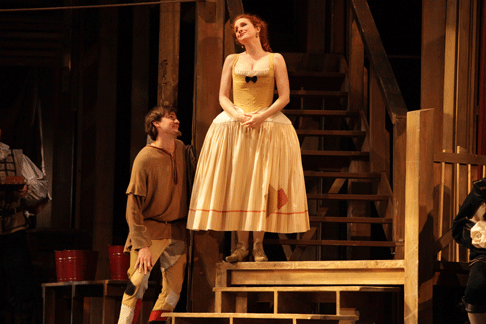Much in the work depends on the wit of the Prologue, in which the richest man in Vienna demands that the evening’s performance in his home merge the planned comedy and tragedy in a staging to last not more than one hour. It would otherwise interfere with the fireworks — the heart of the evening, one gathers — that is to follow.
In the age before titles, the Prologue was sometimes performed in English; the opera in the intended German. Titles now bring home the egotism of singers who fight about dressing rooms and the frustrations of the idealistic young composer who sees his work devastated by the striking of a single note. More important, however, is the foreshadowing of the opera in the intense love that the composer comes to feel for coquettish commedia dell’arte Zebinetta, who in her fickleness seems everything that he and Ariadne are not.
Scored for a mere 35 instruments, Ariadne is — despite Wagnerian vocal demands — a chamber work that echoes the Baroque once dominant in Strauss’ native Bavaria. And it was Patrick Summers thorough understanding of these roots that accounted for the unusual radiance of the staging, seen on opening night of the five-performance Houston run.
This was an Ariadne of cultivated gentleness, in which reserve dominated and in the opera accounted for the seamlessness with which tragedy and comedy blended with such ease. Keeping Strauss’ sometimes runaway sensuality in check, Summers concentrated rather on the intimacy of the opera, drawing the audience into a story that in its intricacy identifies von Hofmannsthal as perhaps the greatest librettist in the history of opera. Conductor Summers, HGO music director, is now an established figure in the world’s opera houses, and here he showed again the polish and sophistication that he has brought to the company’s orchestra.
The central figure in the Prologue is the youthful Composer, a trouser role patterned after the Octavian of Rosenkavalier. In this country Susan Graham continues to hold the copyright on these roles. A dashing and exuberant figure, she played the art-and love-smitten composer with fervor and conviction and without exaggerated mannerisms. She clearly remains at the height of her vocal powers.
Christine Goerke, famous for her interpretation of such dark roles as Wagner’s Ortrud and Kundy and Verdi’s Eboli, brought richness to death-obsessed Ariadne in a performance made luminous by Summer’s disciplined approach to the score. The conductor deserves further praise for the transparency with which the nymphs who watch over Ariadne as the opera opens sang.
Over the past decade Texas-born Laura Claycomb has distinguished herself in works from Handel to Mahler and Britten. Without slighting the playful side of the role, she stressed that Zerbinetta — despite appearances — is looking for the one man to whom she might be true.
Bacchus, an unrewarding assignment, would be a supporting role, were he not needed to engineer the transcendence with which the opera ends. Sometimes a role for ageing Wagnerians — James King comes to mind, Alexey Dolgov is perhaps too young to play Bacchus. (The Siberian-born tenor made his HGO debut as Puccini’s Rodolfo in 2008.)
 John Fanning as Music Teacher and Susan Graham as Composer
John Fanning as Music Teacher and Susan Graham as Composer
It is, however, the role itself that is problematic. Bacchus, at best a bit of a bumpkin, stumbles onto Naxos on the heels of heroic exploits, and — until he falls hopelessly in love with the abandoned Ariadne — doesn’t really understand what is going on there. Neither does Ariadne, who sees him as the envoy of Death. Thus the two sing at cross purposes at the outset of the duet that ends the opera. Nonetheless, one felt that Dolgov had been miscast — the single blemish on the otherwise enviously engaging performance. Of course, one knows Strauss’ antipathy for tenors, and Dolgov’s shortfall underscored that this — like Rosenkavalier — is a womens’ opera.
One left the Wortham with heart warmed by Goerke’s deeply internalized delivery of Ein Scho”nes war and “Es gibt ein Reich” and awed by the effortlessness with which Claycomb proved herself an ideal Zerbinetta.
 Boris Zyakov as Harlequin-and Laura Claycomb as Zerbinetta
Boris Zyakov as Harlequin-and Laura Claycomb as Zerbinetta
Six of the seven youthful singers cast as nymphs and commedia dell’arte clowns were current HGO studio artists, underscoring the high professional standards of that program.
All in all an Ariadne to treasure, the production not only concluded the present HGO season, but further brought down the curtain on Anthony Freud’s all too brief tenure of the company’s general director. (Freud arrived in 2006.) Freud succeeds William Mason at the helm of Chicago Lyric Opera.
Wes Blomster
image=http://www.operatoday.com/Ariadne_HGO_2011_01.gif
image_description=Alexey Dolgov as Bacchus and Christine Goerke as Ariadne [Photo by Felix Sanchez courtesy of Houston Grand Opera]
product=yes
product_title=Richard Strauss: Ariadne auf Naxos
product_by=Richard Strauss Ariadne auf Naxos Prima Donna/Ariadne: Christine Goerke; Tenor/Bacchus: Alexey; Dolgov; Zerbinetta: Laura Claycomb; Composer: Susan Graham; Music Master: John Fanning; Major Domo; Jon Kolbet; Dance Master: Rodell Rosel; Naiad: Kiri Deonarine; Dryad: Catherine; Martin; Echo: Brittany Wheeler; Harlequin: Boris Dyakov; Truffaldino: Robert Gleadow; Brighella: Brendan Tuohy; Scaramuccio: Nathaniel Peake. Conductor: Patrick Summers; Director: John Cox; Set and Costume Director: Robert Perdziola Lighting Director: Duane Schuler; Associate Director: Bruno Ravella; Associate Lighting Director: Michael James Clark; Stage Manager: Christopher Staub. Houston Grand Opera Brown Theater; Wortham Theater Center, April 29, 2011.
product_id=Above: Alexey Dolgov as Bacchus and Christine Goerke as Ariadne
All photos by Felix Sanchez courtesy of Houston Grand Opera